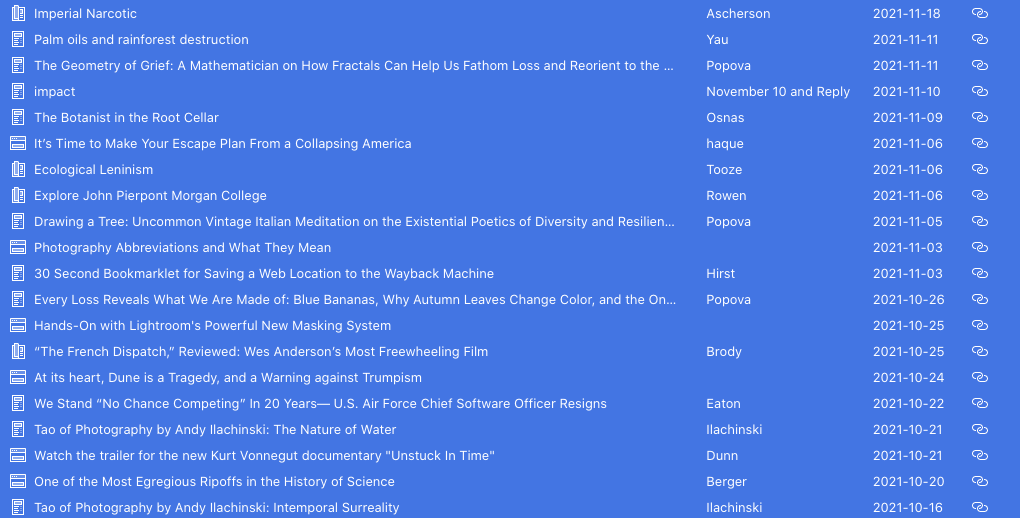A bit more than a month since my last post here, and 2 1/2 yellow pads of notes to oneself and transcriptions of trenchant passages from the still-growing mountain of books I’ve been in and out of as I work on library re-organization and explorations of subjects I’ve defined via explorations past and present. The Auxiliary Library in the barn has been the primary locus, warmed by the sun in the mornings and equipped with reasonable music-playing apparatus (though soon to be upgraded), and the succession of interests mostly traced on those yellow pads. If I leaf through them, here’s what I find:
- Didascalicon (Convivial digression on a patron saint)
- The Biography of a Pixel (Alvy Ray Smith):
slow going, dense, essential - Brief Notes on the Art and Manner of Arranging One’s Books (Georges Perec):
a nudge to my impish side - To Serve Them All My Days:
nostalgia, comfort reading - Wildland: The Making of America’s Fury (Evan Osnos):
- Finding the Mother Tree: Discovering the Wisdom of the Forest
- Hyperobjects: Philosophy and Ecology after the End of the World (Timothy Morton):
revisited, resumed reading - Wallerstein on the world-system The Modern World-System I: Capitalist Agriculture and the Origins of the European World-Economy in the Sixteenth Century:
first bought in 1985; 3 succeeding volumes - Barkskins (Annie Proulx):
started to re-read - Red Rubber, Bleeding Trees: Violence, Slavery, and Empire in Northwest Amazonia, 1850-1933 (Michael Stanfield):
looking on the shelves for something on rubber - Economic Annuals and Human Cultures (Oakes Ames) 1939:
the oldest on the shelves on economic botany - Sixteenth-Century North America: The Land and the People As Seen by the Europeans (Carl Sauer)
- Whole Earth Discipline: Why Dense Cities, Nuclear Power, Transgenic Crops, Restored Wildlands, and Geoengineering Are Necessary (Stewart Brand):
in answer to the question what’s the most recent I have by Stewart Brand - The Atmosphere as Circulatory System of the Biosphere: The Gaia Hypothesis (James Lovelock and Lynn Margulis) 1974:
united again with really portentious article and set of ideas - The Theory of Island Biogeography (Robert H MacArthur and Edward O Wilson):
a classic pulled off the self and puzzled over, via Elizabeth Kolbert - Diet for a Large Planet: Industrial Britain, Food Systems, and World Ecology (Chris Otter):
- Landmarks (Robert Macfarlane):
landscape lexicons - The Cabaret of Plants: Forty Thousand Years of Plant Life and the Human Imagination (Richard Mabey):
- Plant Teachers: Ayahuasca, Tobacco, and the Pursuit of Knowledge (Jeremy Narby):
via a reference in Mabey - Empire of Cotton: A Global History (Sven Beckert):
bought in 2015, just devoured - A World-Systems Reader (Thomas D. Hall) 2000:
wondering what’s the latest I have on world-systems - A World in Crisis? (R Johnson, PJ Taylor) 1986:
chapters on world-system analysis - The World-System and Africa (Immanuel Wallerstein) 2017:
Wallerstein’s last, collecting earlier papers - The Fragmented Forest: Island Biogeography Theory and the Preservation of Biotic Diversity (Larry D. Harris) 1984:
answers the question where did Island Biogeography go? - Opium, Empire and the Global Political Economy: A Study of the Asian Opium Trade (Carl A Trocki):
This Is Your Mind on Plants (Michael Pollan):
(consulted re: opium) - The Baroque Cycle: Quicksilver, The Confusion, and The System of the World (Neal Stephenson):
NB the explanatory material accompanying each volumeThe Great Derangement: Climate Change and the Unthinkable (Amitav Ghosh):
an Indian Ocean view - The Nutmeg’s Curse: Parables for a Planet in Crisis (Amitav Ghosh):
- Orwell’s Roses (Rebecca Solnit):
I’d read anything she wrote - World-Systems Analysis: An Introduction (Immanuel Wallerstein) 2004:
concise introduction to the framework and approach - The Dawn of Everything: A New History of Humanity (David Graeber and David Wengrow):
long awaited, quite amazingPhotography: The Definitive Visual History (Tom Ang):
- 1491: New Revelations of the Americas Before Columbus (Charles C Mann):
picked up again and starting to re-read
That’s a pretty varied ramble and doesn’t include the various miscellany I’ve tossed into Zotero, which are awaiting examination
